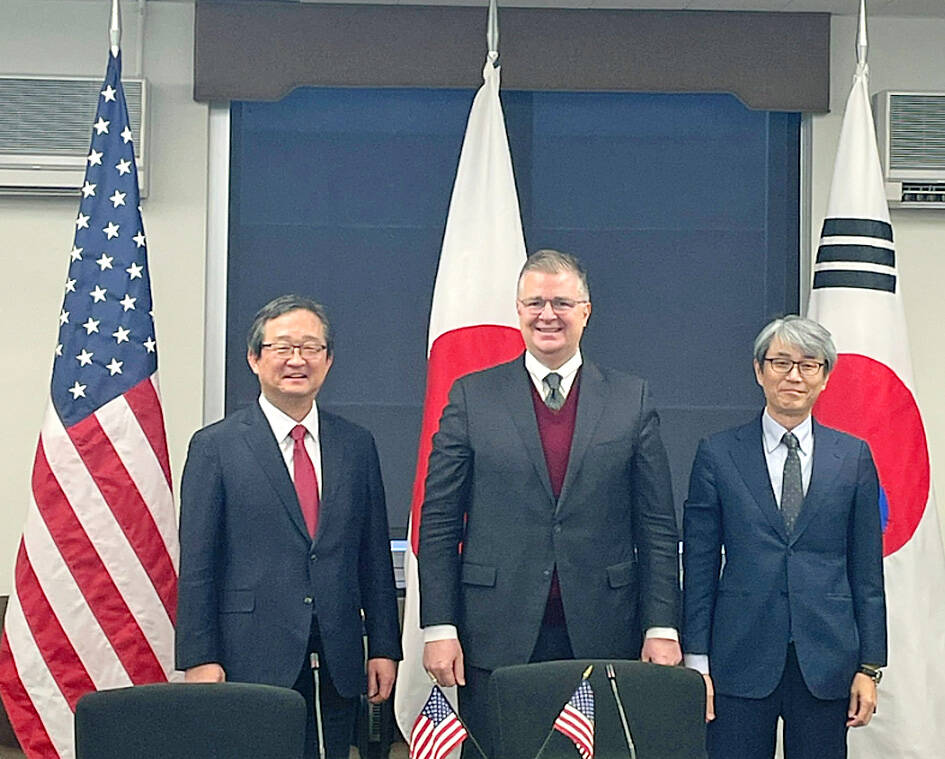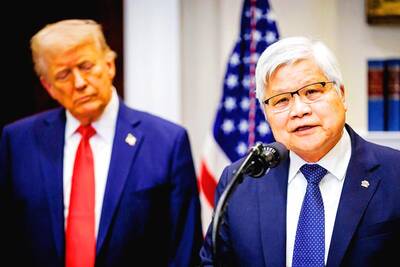The US, Japan and South Korea underlined the importance of peace and stability in the Taiwan Strait in a joint statement issued a day after the three governments held the first trilateral Indo-Pacific Dialogue in Washington on Friday.
US Assistant Secretary of State for East Asian and Pacific Affairs Daniel Kritenbrink, Japanese Foreign Policy Bureau Deputy Minister and Director-General Yasuhiro Kobe and South Korean Deputy Minister of Foreign Affairs Chung Byung-won met to discuss each country’s Indo-Pacific approach and opportunities for cooperation, the US Department of State said in a news release on Saturday.
The three representatives “reaffirmed the importance of peace and stability across the Taiwan Strait as indispensable to security and prosperity in the international community,” it said.

Photo: Screengrab from X page of the US Department Of State Bureau of East Asian and Pacific Affairs
Regarding China’s “dangerous and escalatory behavior supporting unlawful maritime claims” in the South China Sea, the three urged countries to follow international law, the statement said.
They “opposed any unilateral attempts to change the status quo by force or coercion anywhere in the waters of the Indo-Pacific,” it said.
In Taipei, the Ministry of Foreign Affairs welcomed the statement and thanked the three countries for reiterating their stance on the Taiwan Strait issue.
The statement followed the concern voiced by US President Joe Biden, Japanese Prime Minister Fumio Kishida and South Korean President Yoon Suk-yeol during their summit in August last year, the ministry said in a news release yesterday.
Beijing’s recent deployment of balloons across the Taiwan Strait’s median line, suspension of tariff cuts on imports of certain Taiwanese products and cognitive warfare campaign were clear attempts to influence Taiwan’s presidential and legislative elections on Saturday, the ministry said.
The importance of cross-strait peace and stability is a global consensus, it said, adding that Taiwan would continue working with like-minded partners to promote peace, stability and prosperity in the Indo-Pacific region.
Separately, Japan and South Korea could consider Taiwan a common strategic issue, which would improve security in the Indo-Pacific region, a Taiwanese researcher said in the Annual Assessment of the Security Environment in the Indo-Pacific Region report.
The report was published on Wednesday last week by the Institute for National Defense and Security Research.
If Japan and South Korea are willing to cooperate with each other and even with Taipei to deter China from invading Taiwan, a “Taiwan contingency” could be prevented, institute associate research fellow Wang Tsun-yen (王尊彥) said.
Japan’s stance regarding the issue — “a Taiwan contingency is a Japan contingency” — is known, while South Korea has begun voicing concerns about the cross-strait situation in the second half of the administration of former South Korean president Moon Jae-in, he said.
Ensuring peace and stability across the Taiwan Strait is in the two countries’ interests, as a cross-strait conflict would inevitably affect Japan and the Strait is a crucial gateway to Southeast Asia and South Asia, according to South Korea’s New Southern Policy, he said.
Growing ties between Japan and South Korea in the past year have “great strategic significance in terms of the Indo-Pacific region’s security,” he added.

ENDEAVOR MANTA: The ship is programmed to automatically return to its designated home port and would self-destruct if seized by another party The Endeavor Manta, Taiwan’s first military-specification uncrewed surface vehicle (USV) tailor-made to operate in the Taiwan Strait in a bid to bolster the nation’s asymmetric combat capabilities made its first appearance at Kaohsiung’s Singda Harbor yesterday. Taking inspiration from Ukraine’s navy, which is using USVs to force Russia’s Black Sea fleet to take shelter within its own ports, CSBC Taiwan (台灣國際造船) established a research and development unit on USVs last year, CSBC chairman Huang Cheng-hung (黃正弘) said. With the exception of the satellite guidance system and the outboard motors — which were purchased from foreign companies that were not affiliated with Chinese-funded

PERMIT REVOKED: The influencer at a news conference said the National Immigration Agency was infringing on human rights and persecuting Chinese spouses Chinese influencer “Yaya in Taiwan” (亞亞在台灣) yesterday evening voluntarily left Taiwan, despite saying yesterday morning that she had “no intention” of leaving after her residence permit was revoked over her comments on Taiwan being “unified” with China by military force. The Ministry of the Interior yesterday had said that it could forcibly deport the influencer at midnight, but was considering taking a more flexible approach and beginning procedures this morning. The influencer, whose given name is Liu Zhenya (劉振亞), departed on a 8:45pm flight from Taipei International Airport (Songshan airport) to Fuzhou, China. Liu held a news conference at the airport at 7pm,

KAOHSIUNG CEREMONY: The contract chipmaker is planning to build 5 fabs in the southern city to gradually expand its 2-nanometer chip capacity Taiwan Semiconductor Manufacturing Co (TSMC, 台積電), the world’s biggest contract chipmaker, yesterday confirmed that it plans to hold a ceremony on March 31 to unveil a capacity expansion plan for its most advanced 2-nanometer chips in Kaohsiung, demonstrating its commitment to further investment at home. The ceremony is to be hosted by TSMC cochief operating officer Y.P. Chyn (秦永沛). It did not disclose whether Premier Cho Jung-tai (卓榮泰) and high-ranking government officials would attend the ceremony. More details are to be released next week, it said. The chipmaker’s latest move came after its announcement earlier this month of an additional US$100 billion

Authorities yesterday elaborated on the rules governing Employment Gold Cards after a US cardholder was barred from entering Taiwan for six years after working without a permit during a 2023 visit. American YouTuber LeLe Farley was barred after already being approved for an Employment Gold Card, he said in a video published on his channel on Saturday. Farley, who has more than 420,000 subscribers on his YouTube channel, was approved for his Gold Card last month, but was told at a check-in counter at the Los Angeles International Airport that he could not enter Taiwan. That was because he previously participated in two